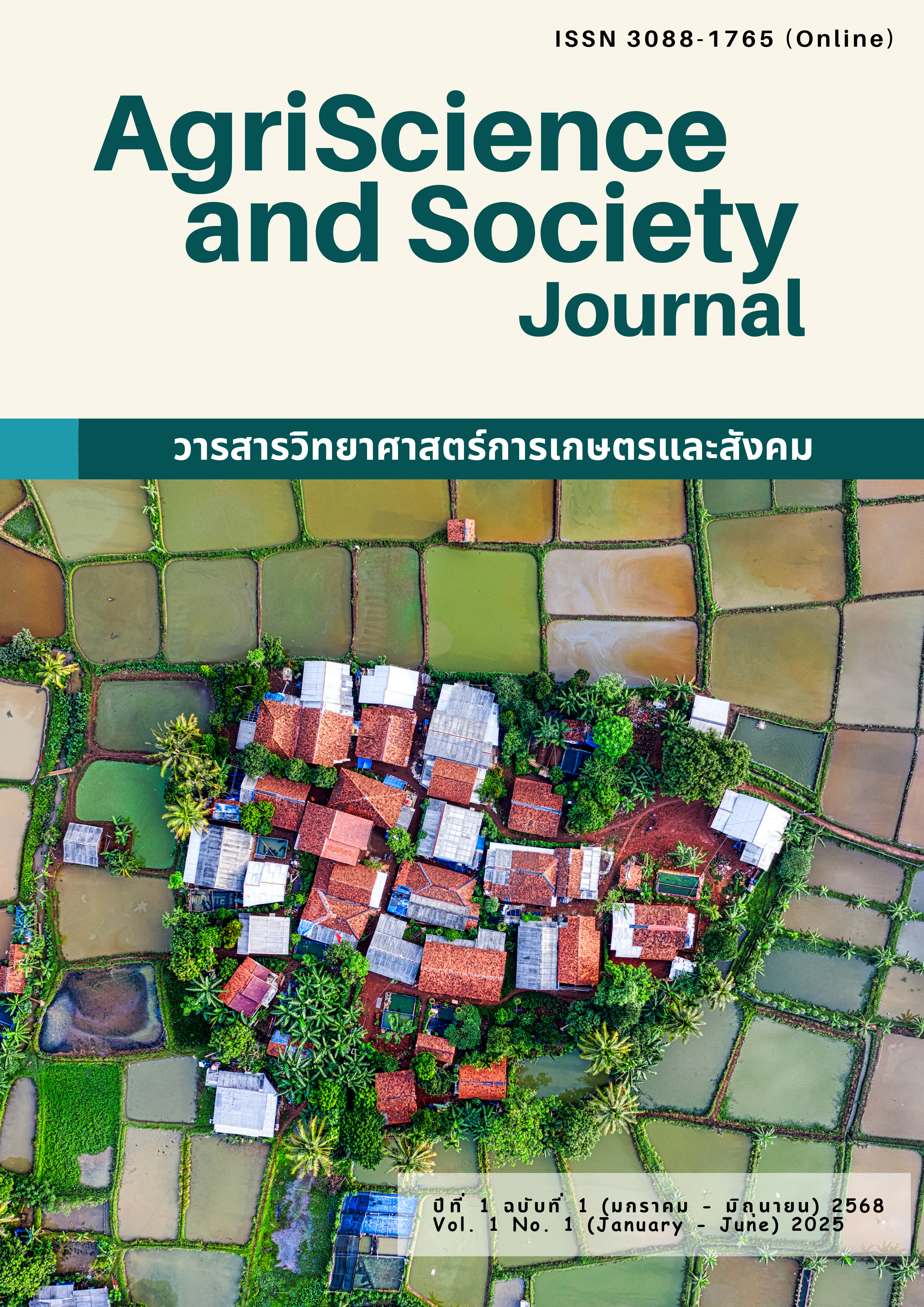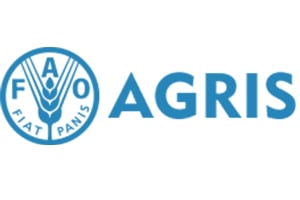Antioxidant Activity, Total Phenolic and Total Flavonoid Content of Etlingera maingayi (Baker) R.M.Sm.
คำสำคัญ:
Antioxidant properties, Ethanolic extract, Polyphenol, Zingiberaceaeบทคัดย่อ
Etlingera maingayi (Baker) R.M.Sm. is a rare plant species native to southern Thailand. It is infrequently utilized, with its primary use being for edible flowers. This study aimed to investigate and evaluate the antioxidant properties of the aerial parts of E. maingayi. Dried plant materials were extracted using ethanol, followed by solvent removal via rotary evaporation. Antioxidant activities were assessed using the 2,2-diphenyl-1-picrylhydrazyl (DPPH), 2,2′-azino-bis(3-ethylbenzothiazoline-6-sulfonic acid) (ABTS) radical scavenging assays, and the ferric reducing antioxidant power (FRAP) assay. The chemical constituents of the extract were quantified using the Folin–Ciocalteu method for total phenolic content and the aluminum chloride colorimetric method for total flavonoid content. The E. maingayi extract exhibited antioxidant activity with an IC₅₀ value of 0.56 ± 0.01 mg/mL in the DPPH assay, compared with Trolox as a positive control (IC50= 0.036 ± 0.003 mg/mL). In the ABTS assay, the extract showed an IC50 value of 4.53 ± 0.59 mg/mL, compared with Trolox (IC50= 0.28 ± 0.06 mg/mL). Furthermore, the extract demonstrated ferric reducing antioxidant power (FRAP) at 150.54 ± 1.79 mg FeSO4/g extract. The total phenolic and flavonoid contents were 83.76 ± 3.36 mg gallic acid equivalents (GAE)/g extract and 65.11 ± 6.84 mg catechin equivalents (CE)/g extract, respectively. These results indicate that the ethanolic extract of the aerial parts of E. maingayi possesses significant antioxidant activity and is rich in polyphenolic compounds. Therefore, this species may serve as a potential natural source of antioxidants for future applications.
เอกสารอ้างอิง
Alam, M.N., Bristi, N.J., and Rafiquzzaman, M. (2013). Review on in vivo and in vitro methods evaluation of antioxidant activity. Saudi Pharmaceutical Journal, 21, 143–152. https://doi.org/10.1016/j.jsps.2012.05.002
Barbosa, G.B., and Minguillan, J.M.O. (2021). Antioxidant activity and total phenolic content of fresh and cured rhizomes of Curcuma longa and Etlingera philippinensis. International Food Research Journal, 28(4), 839–847. https://doi.org/10.47836/ifrj.28.4.20
Barhé, T.A., and Tchouya, G.R.F. (2016). Comparative study of the antioxidant activity of the total polyphenols extracted from Hibiscus sabdariffa L., Glycine max (L.) Merr., yellow tea, and red wine through reaction with DPPH free radicals. Arabian Journal of Chemistry, 9(1), 1–8. https://doi.org/10.1016/j.arabjc.2014.11.048
Benzie, I.F.F., and Strain, J.J. (1996). The ferric reducing ability of plasma (FRAP) as a measure of “antioxidant power”: The FRAP assay. Analytical Biochemistry, 239, 70–76. https://doi.org/10.1006/abio.1996.0292
Chan, E.W.C., Lim, Y.Y., and Omar, M. (2007). Antioxidant and antibacterial activity of leaves of Etlingera species (Zingiberaceae) in Peninsular Malaysia. Food Chemistry, 104, 1586–1593. https://doi.org/10.1016/j.foodchem.2007.03.023
Chongkraijak, W., Ngamnriabsakul, C., and Poulsen, A.D. (2013). Morphological diversity and distribution of Etlingera littoralis (König) Giseke (Zingiberaceae) in southern Thailand. Walailak Journal of Science and Technology, 10(6), 643–656. https://doi.org/10.2004/wjst.v10i6.634
Duh, P.D., Tu, Y.Y., and Yen, G.C. (1999). Antioxidant activity of aqueous extract of Harng Jyur (Chrysanthemum morifolium Ramat). Lebensmittel-Wissenschaft und-Technologie, 32, 269–27. https://doi.org/10.1006/fstl.1999.0548
Hall, C.A., and Cuppett, S.L. (1997). Structure-active of natural antioxidant. In O. I. Auroma and S. L. Cuppett (Eds). Antioxidant methodology in vivo and in vitro concepts (pp. 141–170). Champaign, IL: AOCS Press.
Jia, Z., Tang, M., and Wu, J. (1999). The determination of flavonoid contents in mulberry and their scavenging effects on superoxide radicals. Food Chemistry, 64, 555–559. https://doi.org/10.1016/S0308-8146(98)00102-2
Khaw, S.H. (2001). The genus Etlingera (Zingiberaceae) in peninsular Malaysia including a new species. Gardens’ Bulletin Singapore, 53(1-2), 233-234.
Mendez, N.P., Mendez, R.A., Villafranca-Tuba, A.R., Tubongbanuam, R.M., and Acma, F.M. (2023). Morphology, phenolic content, and antioxidant activity of Etlingera fimbriobracteata (K.Schum.) R.M.Sm. and E. philippinensis (Ridl.) R.M.Sm. (Zingiberaceae). Philippine Journal of Science, 152 (2), 653–664. https://doi.org/10.56899/152.02.10
Pant, P., Pandey, S., and Dall'Acqua, S. (2021). The Influence of environmental conditions on secondary metabolites in medicinal plants: a literature review. Chemistry & Biodiversity, 18, e2100345. https://doi.org/10.1002/cbdv.202100345
Poulsen, A.D. (2006). Etlingera of Borneo. Kota Kinabalu, Malaysia: Natural History Publications (Borneo).
Poulsen, A.D. (2012). Etlingera of Sulawesi. Kota Kinabalu, Malaysia: Natural History Publications (Borneo).
Saudah, S., Zumaidar, Z., Darusman, D., Roslim, D.I., and Ernilasari, E. (2022). Ethnobotanical knowledge of Etlingera elatior for medicinal and food uses among ethnic groups in Aceh Province, Indonesia. Biodiversitas, 23(8), 4361–4370. https://doi.org/10.13057/biodiv/d230862
Shahid-Ud-Daula, A.F.M., Kamariah, A.S., Lim, L.B.L., and Ahmad, N. (2015). Phytochemical screening, antioxidant, and antimicrobial activities of leaves, stems, and rhizomes of Etlingera coccinea (Blume) S. Sakai & Nagam. International Journal of Pharmacognosy and Phytochemical Research, 7(5), 873–883.
Shahid-Ud-Daula, A.F.M., and Mohammad, A.B. (2019). Genus Etlingera – A review on chemical composition and antimicrobial activity of essential oils. Journal of Medicinal Plants Research, 13 (7), 135–156. https://doi.org/10.5897/JMPR2019.6740
Sirirugsa, P. (1998). Thai Zingiberaceae: Species diversity and their uses. Pure and Applied Chemistry, 70(11), 2111–2119.
Utami, Y.P., Yulianty, R., Djabir, Y.Y., and Alam, G. (2024). Antioxidant activity, total phenolic and total flavonoid contents of Etlingera elatior (Jack) R.M. Smith from north Luwu, Indonesia. Tropical Journal of Natural Product Research, 8(1), 5955–5961. http://www.doi.org/10.26538/tjnpr/v8i1.34
Whangsomnuek, N., Mungmai, L., Mengamphan, K., and Amornlerdpison, D. (2019). Efficiency of skin whitening cream containing Etlingera elatior flower and leaf extracts in volunteers. Cosmetics, 6(3), 39. https://doi.org/10.3390/cosmetics6030039
Zeb, A. (2020). Concept, mechanism, and applications of phenolic antioxidants in foods. Journal of Food Biochemistry, 44(9), e13394. https://doi.org/10.1111/jfbc.13394
ดาวน์โหลด
เผยแพร่แล้ว
รูปแบบการอ้างอิง
ฉบับ
ประเภทบทความ
สัญญาอนุญาต
ลิขสิทธิ์ (c) 2025 Natural Resources

อนุญาตภายใต้เงื่อนไข Creative Commons Attribution-NonCommercial-NoDerivatives 4.0 International License.
วารสารทรัพยากรธรรมชาติและวิทยาศาสตร์การเกษตร อยู่ภายใต้การอนุญาต Creative Commons Attribution-NonCommercial-NoDerivatives 4.0 International (CC BY-NC-ND 4.0) เว้นแต่จะระบุไว้เป็นอย่างอื่น โปรดอ่านหน้านโยบายของเราสำหรับข้อมูลเพิ่มเติมเกี่ยวกับการเข้าถึงแบบเปิด ลิขสิทธิ์ และการอนุญาต






